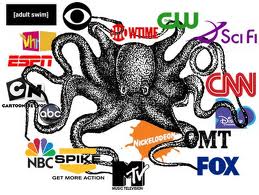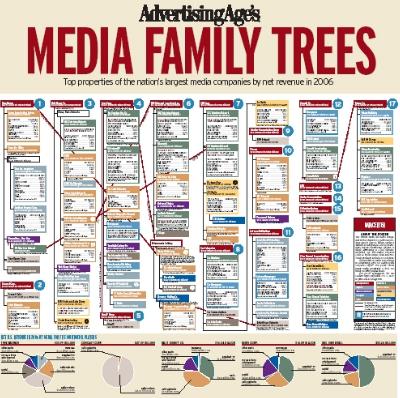Most media organisations are owned by multi-national multi-billion dollar corporations that are involved in a number of businesses apart from the media, such as forestry, pulp and paper mills, defence, real estate, oil wells, agriculture, steel production, railways, water and power utilities. Such conglomerates not only create potential conflicts of interest in reporting the news but ensure the makers of the news take a corporate view.
 Rupert Murdoch’s media empire, News Corporation, has included book publishing companies, newspaper, broadcast television, cable television, satellite television, Festival Records, 20th Century Fox as well as interests in computer software, offshore oil and gas and air transport.
Rupert Murdoch’s media empire, News Corporation, has included book publishing companies, newspaper, broadcast television, cable television, satellite television, Festival Records, 20th Century Fox as well as interests in computer software, offshore oil and gas and air transport.
The boards of these media companies typically include representatives of international banks, multinational oil companies, car manufacturers and other corporations.
For example out of the 12 people sitting on the board of The New York Times, all 12 of them had an interest tied to at least two other major corporations, businesses, banks, advertising companies, pharmaceuticals or industries under government influence. Some of these industries include Merck Schering-Plough Corporation, the second largest pharmaceutical company in the world; Flamel Tech, a drug delivery business; and the Carlyle group, an infamously corrupt defense equity firm... Also on the board are executives from Tropicana, Nabisco, Verizon, Telecom, Bell Atlantic, Hallmark, Lehman Brothers, Pepsi, Sara Lee and Staples.
|
Reference: Herman & Chomsky quoted in William A. Gamson, David Croteau, William Hoynes and Theodore Sasson, 'Media Images and the Social Construction of Reality', Annual Review of Sociology, Vol. 18 (1992), pp. 379-80.
Also, during the 1980s because of the spate of corporate takeovers, many media organisations “lost some of their limited autonomy to bankers, institutional investors, and large individual investors whom they have had to solicit as potential ‘white knights’.” Reference: Ben H. Bagdikian, The Media Monopoly (Beacon Press: Boston, 1983), p 32.
About a third of newspaper chain editors admitted in a survey by the American Society of Newspaper Editors that they “would not feel free to run a news story that was damaging to their parent firm.” |

Click here to enlarge |
Noam Chomsky, who has documented a number of biases in the US media’s treatment of foreign affairs, points out that media corporations “are closely integrated with even larger conglomerates” and like other business they sell a product—audiences—to buyers—advertisers.
In short, the major media—particularly, the elite media that set the agenda that others generally follow—are corporations ‘selling’ privileged audiences to other businesses. It would hardly come as a surprise if the picture of the world they present were to reflect the perspectives and interests of the sellers, the buyers, and the product...